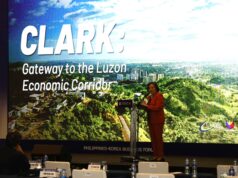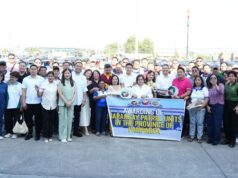So what’s keeping us from reverting to September 21 as Thanksgiving Day?
With the Marcoses all over us today, there, indeed, maybe something intuitive – I still lack the conceit to call it prophetic – in what I wrote here September 21 last year.
THE EVIL that men do lives after them; the good is oft interred with their bones. So the Bard of Avon wrote.
So it is with Ferdinand Edralin Marcos. Denounced as tyrant, damned as megalomaniac. His singularly evil act: Proclamation 1081, declaring the whole Philippines under martial law on September 21, 1972.
On this the 37th anniversary of that day that has lived in infamy, to steal the words of the American President Franklin Delano Roosevelt appended on the sneak Japanese attack on Pearl Harbor on December 7, 1941, I – a victim of martial law – find time to hear Marcos speak of his deed.
WHEREAS, the rebellion and armed action undertaken by these lawless elements of the communist and other armed aggrupations organized to overthrow the Republic of the Philippines by armed violence and force have assumed the magnitude of an actual state of war against our people and the Republic of the Philippines;
NOW, THEREFORE, I, FERDINAND E. MARCOS, President of the Philippines, by virtue of the powers vested upon me by Article VII, Section 10, Paragraph (‘2) of the Constitution, do hereby place the entire Philippines as defined in Article I, Section 1 of the Constitution under martial law and, in my capacity as their commander-in-chief, do hereby command the armed forces of the Philippines, to maintain law and order throughout the Philippines, prevent or suppress all forms of lawless violence as well as any act of insurrection or rebellion and to enforce obedience to all the laws and decrees, orders and regulations promulgated by me personally or upon my direction..
So went Proclamation 1081. Cut and dry legalese there. Marcos, outside his being an astute lawyer, had the aspirations to philosophy and history. Hence, the deeper reflection over the proclamation he wrote in his Notes on the New Society in 1973:
Great decisions are made for us as much as we make them. I am, to be sure, accountable to history for 21 September 1972…And yet, solely and completely responsible as I am for this decision, I cannot escape the sense that events, the thrust of history, and even the will of the people, somehow guided my hand to the deed. I say this not to exculpate myself in advance – this is impossible, no man can cheat history – but to offer one more instance, out of personal experience , of a well-known suspicion: that behind every man who makes history are forces which blur the distinction between individual initiative and historical necessity. The adherents of opposing views of history can find whatever support that may please them, but to the man who, like myself, has touched by a single act the very nerve of history, it is a source of confidence to know that while he stands alone, he had not acted in isolation, outside or in opposition to the compelling circumstances of his time and place.
Ah, sheer brilliance! Irretrievably lost in the succeeding presidencies.
Again, from his Notes on the New Society:
The severest critics of martial law …have to grant two things about it: its compelling necessity and its uniqueness.
To recapitulate, the compelling necessity arises out of the seven grave threats to the existence of the Republic: the Communist rebellion, the rightist conspiracy, the Muslim secessionist movement, the rampant corruption on all levels of society, the criminal and criminal-political syndicates – including the private armies – the deteriorating economy and increasing social injustice…
Our martial law is unique in that it is based on the supremacy of the civilian authority over the military and on complete submission to the decision of the Supreme Court.
The nation caught in a time warp: the seven threats to the Republic, then as now, clear and present, even graver. What was that Irish saying? There is no present, there is no future. Only the past happening over and over again.
Yeah, and Santayana too: Those who do not learn the lessons of history are doomed to repeat its mistakes. Well into the martial law years, in a meeting with the Foreign Correspondents Association of the Philippines in June 1977, Marcos spoke:
What has happened in the Philippines during this period may be taken as a microcosm, as a mirror of the whole. After 26 years of being hailed as a bastion of American-type democracy in Asia, we were met with anarchy, rebellion and the breakdown of the entire democratic system which had been corrupted by the oligarchs. They controlled economic wealth and sought to impose themselves on the political leadership, many of whose members they controlled, and also through the media.
So it became necessary to proclaim martial law. And this is something for which I alone am responsible…I might have been led to it by circumstances more tyrannical than are known, but it was solely my act when I proclaimed martial law. And I hold myself responsible for this to my contemporaries and to the future generations as well as to history.
No final judgment of history on Marcos, as yet. With the unraveling contemporary times, history may ultimately look at him more kindly.
Marcos! Marcos! Marcos pa rin then?



